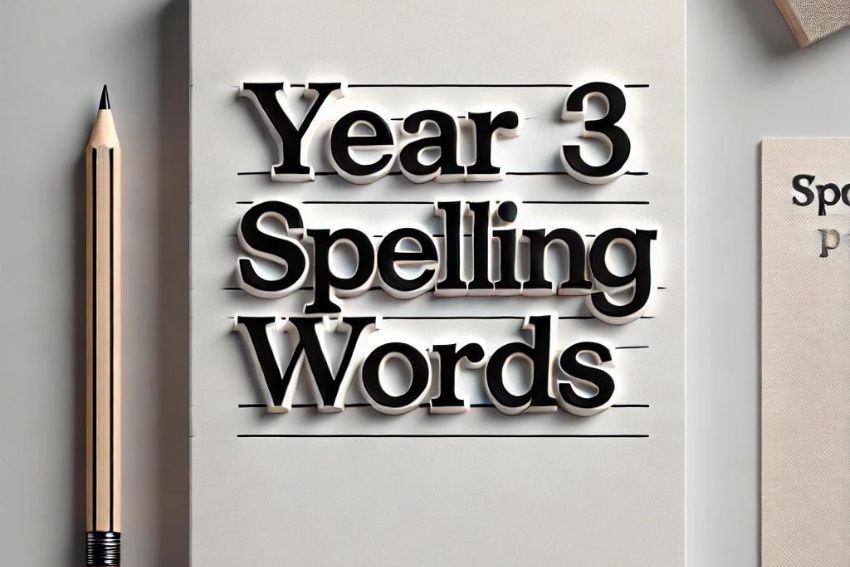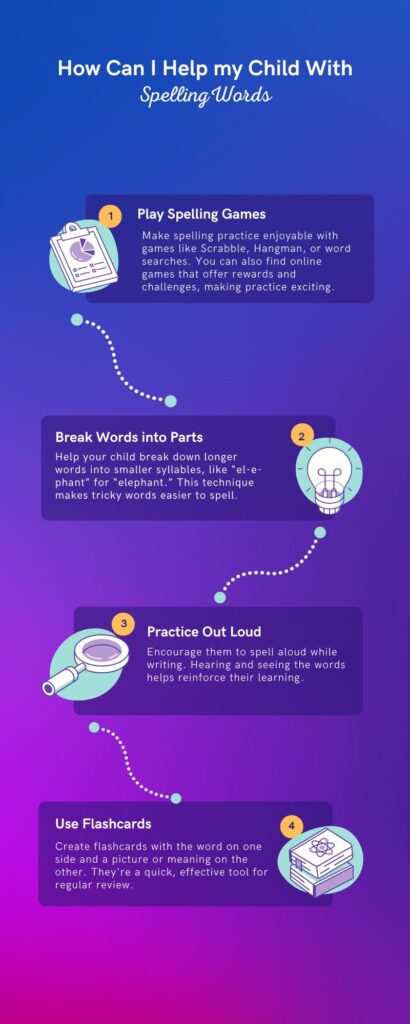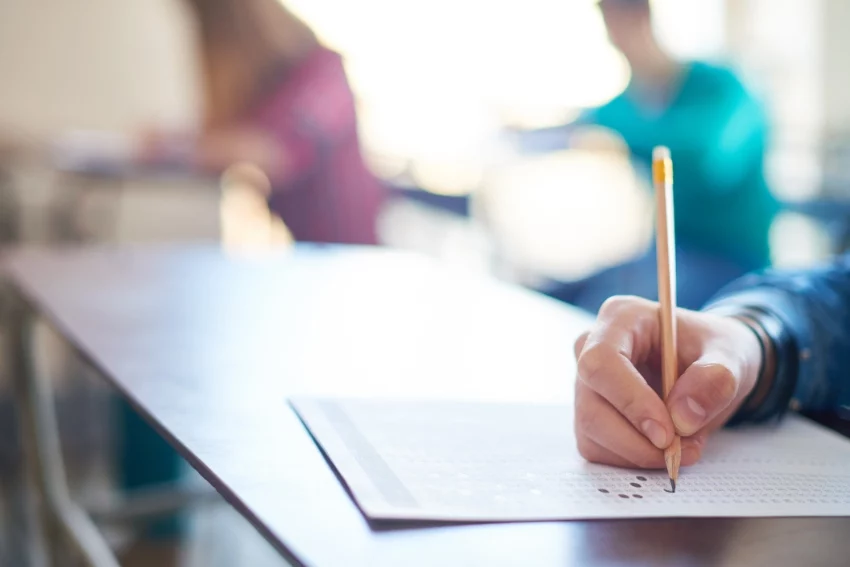In Year 3, spelling becomes an important skill for children as they continue their journey in reading and writing. At this stage, pupils move beyond the basics covered in Year 2 and start learning more complex words and spelling patterns. This helps them become more confident in their writing and improves their reading too.
In this blog, we’ll look at key spelling words for Year 3, share simple tips to help children learn, and suggest fun activities to make spelling practice enjoyable for everyone.

Spelling Words List
We break down words in two sections by alphabet and here are examples in almost every letter which is exact words which you need to know and can use to practise with your child. Here is Spelling – work for years 3 and 4 from gov.uk
Year 3 Spelling Words by Alphabet From A to H
| Accident | Breath | Circle | Eight | Forward |
| Accidentally | Breathe | Complete | Eighth | Fruit |
| Actually | Build | Continue | Enough | Grammar |
| Address | Busy | Decide | Exercise | Group |
| Answer | Business | Describe | Experience | Guard |
| Appear | Calendar | Different | Experiment | Guide |
| Arrive | Caught | Difficult | Extreme | Heard |
| Believe | Centre | Disappear | Famous | Heart |
| Believe | Century | Early | Favourite | Height |
| Bicycle | Certain | Earth | February | History |
Year 3 Spelling Words by Alphabet from I to W
| Imagine | Medicine | Peculiar | Quarter | Strange |
| Important | Mention | Perhaps | Question | Strength |
| Increase | Minute | Popular | Recent | Suppose |
| Interest | Natural | Position | Regular | Surprise |
| Island | Notice | Possession | Reign | Thought |
| Knowledge | Occasionally | Possible | Remember | Through |
| Learn | Often | Potatoes | Sentence | Various |
| Length | Opposite | Pressure | Separate | Weight |
| Library | Ordinary | Promise | Special | Woman |
| Material | Particular | Purpose | Straight | Women |
Here is PDF version of this words which you can download and use them easier
How Does Spelling Help My Child?
Spelling is an important skill that helps children in many areas of learning. It’s not just about memorising how words are written. It helps with reading, writing, and much more. Here’s how spelling can benefit your child:
- Improves Reading
Learning to spell helps children recognise patterns and sounds in words, which makes reading easier and more enjoyable. - Builds Vocabulary
As children learn new spelling words, they also learn what these words mean. This expands their vocabulary, making them more confident in using different words. - Boosts Writing Confidence
When children can spell words correctly, they feel more confident in their writing. They can focus on what they want to say instead of worrying about spelling mistakes. - Encourages Focus on Detail
Spelling teaches children to pay attention to details, like letter combinations and spelling rules. This can help them in other subjects too, as they develop careful attention to detail. - Supports Academic Success
Good spelling is key for success in subjects like English, where correct spelling is often required in tests and assignments. Strong spelling skills can also help children do better in spelling tests. - Strengthens Memory
Learning spelling patterns and rules boosts memory and thinking skills. This is useful for many other areas of learning and problem-solving.
How Can I Help My Child with Spelling Words?

Helping your child with spelling doesn’t have to be difficult. By adding simple habits into your daily routine, you can make a big difference in their spelling skills. These practical tips will not only help them learn but also make spelling practice fun and engaging
Play Spelling Games
Turn spelling practice into a fun activity by using games. Spelling games like Scrabble, Hangman, or word searches make learning enjoyable and less of a chore. Moreover, You can even find online spelling games that engage your child through challenges and rewards, making spelling practice something they look forward to.
Break Words into Parts
Help your child tackle tricky words by breaking them into smaller, manageable parts or syllables. For example, “elephant” can be split into “el-e-phant.” This technique simplifies longer words and helps children see patterns, making spelling more intuitive and less daunting.
Practice Spelling Out Loud
Encourage your child to say each letter out loud while they write it down. This method reinforces the spelling through both visual and auditory learning, making it easier to remember. Repeating words out loud also helps with tricky spellings and builds their confidence.
Use Flashcards
Flashcards are not only a quick but also an effective way to reinforce spelling. First, write the word on one side of the card and then the meaning or a picture on the other. Moreover, flashcards allow for repeated exposure and can be used anytime for a quick spelling quiz, making them, therefore, perfect for on-the-go practice.
Spelling Rules Overview
Understanding key spelling rules can make a big difference in helping children improve their spelling skills. In Year 3, children are introduced to a range of spelling patterns and rules that help them spell more complex words. Here are some important spelling rules to know:
- Adding Suffixes
When adding suffixes like -ing, -ed, or -er to words, the spelling of the base word sometimes changes. For example:- Drop the final e: “make” becomes “making” or “hope” becomes “hoped.”
- Double the final consonant: For one-syllable words with a short vowel followed by a consonant, like “hop,” double the consonant before adding a suffix: “hopping” or “hopped.”
- Changing ‘y’ to ‘i’
When adding -ed or -es to a word that ends in -y, change the y to an i. For example:- “cry” becomes “cried.”
- “carry” becomes “carried.”
- Silent Letters
Some words contain silent letters that aren’t pronounced, but still need to be included in the spelling. Common examples include:- k in “knight” or “know.”
- w in “write” or “wrist.”
- Doubling Consonants
For words where the last syllable is stressed and ends with a consonant, double the consonant when adding a suffix. For example:- “forget” becomes “forgetting.”
- “begin” becomes “beginning.”
- Plurals of Words Ending in ‘f’ or ‘fe’
When forming plurals, if a word ends in f or fe, change it to ves. For example:- “leaf” becomes “leaves.”
- “knife” becomes “knives.”
- Homophones
These are words that sound the same but have different spellings and meanings, like “their,” “there,” and “they’re.” Learning these helps avoid common spelling mistakes. - The ‘i before e’ Rule
A common rule in English is “i before e, except after c.” For example:- “believe” or “friend” follow the rule.
- “receive” breaks it due to the c before the ei.
Conclusion – Supporting Your Child
Mastering Year 3 spelling words is a crucial step in your child’s literacy development, providing the foundation for more advanced language skills. By consistently practising and engaging with these words, children build confidence and improve their reading and writing abilities, preparing them for the more complex vocabulary they’ll encounter in Year 4. However, if you feel your child needs extra support, personalised help from a dedicated tutor can make all the difference.
At Edumentors, we connect you with expert tutors who specialise in tailored spelling and literacy sessions, ensuring your child receives the individual attention they need. Our tutors can provide engaging exercises and techniques to strengthen their spelling skills, offering the perfect complement to classroom learning. Hence, Visit Edumentors today to find the right tutor for your child’s needs and help them excel in their spelling journey.








